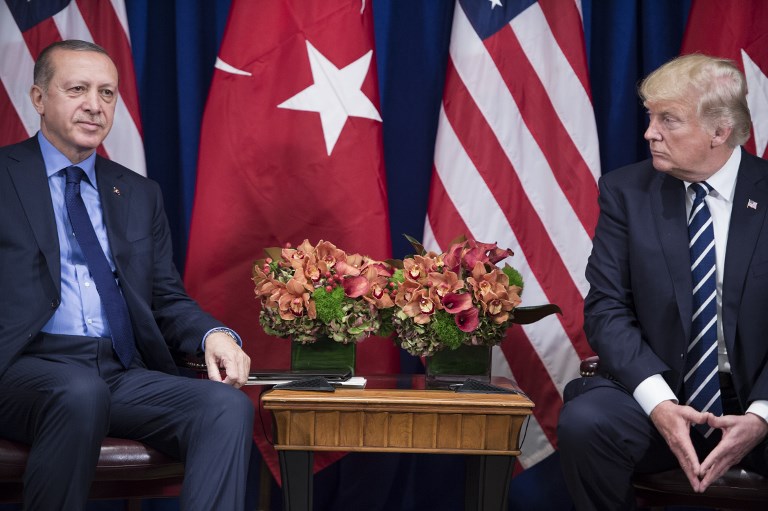Erdogan says US sanctions on Iran go against international law


Ankara-Washington relations have been strained since a 2016 coup attempt in Turkey (AFP/File photo)
Turkish President Recep Tayyip Erdogan has spoken out against US sanctions on Iran, saying the measures violate international law and Ankara will not abide by them.
Washingtons latest round of renewed sanctions on Tehran came into effect on Monday, as US President Donald Trumps administration aims to isolate the countrys banking sector and oil exports.
Turkey, which imports nearly half of its oil from neighbouring Iran, was one of eight countries granted exemptions to the sanctions, the US State Department announced.
Despite that, Erdogan said on Tuesday that the sanctions were inappropriate.
“We don't find the (Iran) sanctions appropriate," he was quoted as saying by the state-run Anadolu news agency.
"Because to us, they are aimed at upsetting the global balance," Erdogan said. "They are against international law and diplomacy. We don't want to live in an imperial world."
They are against international law and diplomacy. We don't want to live in an imperial world
-Recep Tayyip Erdogan, Turkish president
He went further to say that Ankara would not abide by the sanctions. Erdogan also said he intends to discuss the sanctions, among other issues, with Trump at a summit in Paris on the weekend.
"We buy 10 billion cubic metres of natural gas. We cannot freeze our people in the cold," Erdogan said.
The Turkish leaders comments came after his foreign minister, Mevlut Cavusoglu, warned that isolating Iran was "dangerous”.
"While we were asking (for) an exemption from the United States, we have also been very frank with them that cornering Iran is not wise. Isolating Iran is dangerous and punishing the Iranian people is not fair," he said at a press conference during a trip to Japan.
"Turkey is against sanctions, we don't believe any results can be achieved through the sanctions," he added. "I think instead of sanctions, meaningful dialogue and engagement is much more useful."
700 individuals, entities subject to US sanctions
US Treasury Secretary Steve Mnuchin said earlier this week that the new sanctions identify more than "700 individuals, entities, aircraft, and vessels”, including 300 new targets.
Those sanctions also include 50 Iranian banks and subsidiaries, more than 200 people and vessels in its shipping sector, and Tehran's national airline, Iran Air, and more than 65 of its aircraft, according to a US Treasury statement.
READ MORE ►
On Tuesday, a spokesperson for US Secretary of State Mike Pompeo announced an exemption would be granted to allow the India-led development of an Iranian port, planned as part of a new transportation corridor designed to boost Afghanistan's economy, to go ahead.
That exemption will permit the construction of a railway line from Chabahar port to Afghanistan, and for shipments to the country of non-sanctionable goods, like food and medicines, the spokesman said. Afghanistan will also be allowed to continue importing Iranian petroleum products.
"These activities are vital for the ongoing support of Afghanistan's growth and humanitarian relief," the spokesman said in a statement emailed to Reuters.
A day earlier, Trump said he wanted to impose sanctions on Irans oil sector gradually. “On oil we want to go a little bit slower because I don't want to drive (up) the oil prices in the world," he told reporters.
Meanwhile, Erdogan's comments came less than a week after the US and Turkey agreed to lift tit-for-tat sanctions that were imposed on officials from their respective countries in relation to the jailing of a US pastor in Turkey.
Ankara-Washington relations have been strained since a failed coup was launched in Turkey in July 2016, and worsened during Turkey's two-year detention of US pastor Andrew Brunson, who was released last month.
In addition to the criticism from Turkey, one of the US's key NATO allies, the sanctions have pitted Washington against some of its European allies, who remain committed to a 2015 nuclear agreement with Iran.
The Trump administration pulled out of that deal in May, which was signed between Iran, the US and other world powers and was designed to curb Irans nuclear ambitions.
[contf]
[contfnew]

middle east eye
[contfnewc]
[contfnewc]




